FYI.
– More Details Emerge Of Yemeni Rebel Cruise Missile Launch On Abu Dhabi Nuclear Plant
* * *
PayPal: Donate in USD
PayPal: Donate in EUR
PayPal: Donate in GBP
The man who trades freedom for security does not deserve nor will he ever receive either. – Benjamin Franklin

– The Mystery Of Dubai’s Vaporized Gold: The Plot Thickens:
Earlier this week, we told a fascinating story about an unprecedented, multi-year smuggling ring involving Turkey, Iran, and Dubai (as well as China, Russia and countless other nations) which saw corruption reaching to the very top of the political and financial establishment: from president Erdogan in Turkey, to one of Turkey’s richest people, Iran-born Riza Sarraf, to Sheikh Sultan Bin Khalifa Al Nahyan, the son of the ruler of Abu Dhabi and one of the world’s richest people. The smuggled object in question was gold, billions of dollars worth of gold.
Read moreThe Mystery Of Dubai’s Vaporized Gold: The Plot Thickens
H/t reader squodgy:
“The USA will not supply weapons to Kiev…..erm….”
– U.S. Pushes For Escalation, Arms Kiev By Laundering Weapons Through Abu Dhabi (Moon of Alabama, Feb 24, 2015):
The U.S. is circumventing its own proclaimed policy of not delivering weapons to Ukraine and is thereby, despite urgent misgivings from its European allies, increasing the chance of a wider catastrophic war in Europe.
The Ukrainian coup president Poroshenko went to an international arms exhibition in Dubai. There he met the U.S. chief military weapon salesman.
Read moreU.S. Pushes For Escalation, Arms Kiev By Laundering Weapons Through Abu Dhabi
– It’s Not Just Russia: Middle East In Freefall, Biggest Plunge In 6 Years (ZeroHedge, Dec 16, 2014):
Dubai’s Financial Market General Index is now down 40% since the peak in oil prices in June this year. For now, only Qatar is clinging to gains year-to-date as the rest of the Middle Eastern equity markets give up 30-60% gains from mid-year and tumble to negative. Dubai and Abu Dhabi alone are down over 8% since Friday. Saudi Arabia is down 7.3% today – the biggest drop in 6 years.
Saudi Arabia’s worst day in 6 years
– It Wasn’t Only China: Here Is What Else Is Crashing Overnight (ZeroHedge, Dec 9, 2014):
It wasn’t just China’s long overdue crash last night. In addition to the Shanghai Composite suffering its biggest plunge since August 2009, there has been a sharp slide in the USDJPY which has broken its uptrend to +? (and hyperinflation), and around the time Chinese gamblers were panicking, the FX pair tumbled under 120, although since then the 120 tractor beam has been activated. Elsewhere, the Athens stock exchange is also crashing by over 10% this morning on the heels of news that the Greek government has accelerated the process to elect the next president and possibly, a rerun of the drama from the summer of 2012 when the Eurozone was hanging by a thread when Tsipras almost won the presidential vote and killed the world’s most artificial and insolvent monetary union. And finally, the crude plunge appears to have finally caught up with ground zero, with ADX General Index in Abu Dhabi plunging 3.5%, also poised for the biggest drop since 2009. In fact the only thing that isn’t crashing (at least not this moment), is Brent, which did drop to new 5 year lows earlier under $66, but has since staged a feeble rebound.
So… another record high in the fully decoupled from the rest of the world (as well as reality and reationality) S&P500 any minute now?
Read moreIt Wasn’t Only China: Here Is What Else Is Crashing Overnight
30.08.2014
Britain’s support of the authoritarian regimes of the Arabian Peninsula is deeply rooted in their vast economic and military interests through often corrupt partnership between the royal families. In this documentary the history of these relations are studied; and it shows how huge amounts of oil revenue is again invested in Britain by Arabian princesses instead of being spent on the people of these nations and where these funds are needed. The torture and murder of an Afghan laborer at the hands of an Abu Dhabi prince with the aid of the police is also depicted.
– Bernanke’s Not Wasting Any Time – Earns $250,000+ for a Speech in Abu Dhabi (Liberty Blitzkrieg, March 4, 2014):
Ben Bernanke isn’t wasting any time cashing in on what might be the greatest transfer of wealth in history from 99.9% of the world’s population to a handful of connected oligarchs and their political minions. Cronyism does indeed pay well, even if bureaucrats have to wait until they leave office to collect.
The Bernank isn’t wasting any time ringing the register.
From Reuters:
Former Federal Reserve Chairman Ben Bernanke said the U.S. central bank could have done more to fight the country’s financial crisis and that he struggled to find the right way to communicate with markets.
“We could have done some things on the margin to mitigate somewhat the crisis,” Bernanke, 60, said on Tuesday in his first public speaking engagement since he stepped down in January after eight years heading the Fed.
Read moreBernanke Received $250,000+ For A Speech In Abu Dhabi
May 16 (Reuters) — The crown prince of Abu Dhabi has hired the founder of the private security firm Blackwater Worldwide to set up an 800-member battalion of foreign troops for the United Arab Emirates, the New York Times reported Sunday.
The Times said it obtained documents that showed that the unit being formed by Erik Prince’s new company, Reflex Responses, with $529 million from the UAE would be used to thwart internal revolt, conduct special operations and defend oil pipelines and skyscrapers from attacks.
The newspaper said the UAE’s decision to hire the contingent of foreign troops was taken before a wave of popular unrest spread across the Arab world in recent months, including to neighboring Bahrain and Oman.
Read moreBlackwater Hired To Set Up A 800-Member Mercenary Battalion For The United Arab Emirates

Children play in the street during a rain storm in Abu Dhabi Photo: ALAMY
Scientists employed by Sheikh Khalifa bin Zayed Al Nahyan, president of the UAE and leader of Abu Dhabi, successfully created more than 50 rainstorms in the state’s Al Ain region last year, mostly in July and August when there is virtually no rain at all. It is believed to be the first time the system has produced rain from clear skies.
They have been using giant ionisers, shaped like giant lampshades, to generate fields of negatively charged particles, which create cloud formation.
Read moreSecret Abu Dhabi Weather Project ‘Creates More Than 50 Man-Made Rainstorms’
– UAE rescue team continue search for Shaikh Ahmad (GulfNews)
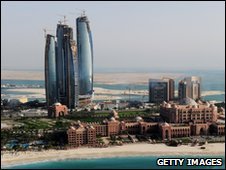 Sheikh Ahmed is a member of Abu Dhabi’s ruling family Sheikh Ahmed is a member of Abu Dhabi’s ruling family |
A search is on in Morocco for a leading member of the Abu Dhabi ruling family after a glider he was in crashed into an artificial lake south of Rabat.
Sheikh Ahmed bin Zayed al-Nahayan, a younger brother of Abu Dhabi’s ruler, manages what is thought to be the world’s biggest sovereign wealth fund.
The glider pilot was rescued and is in good condition, state media say.
Sheikh Ahmed was No 27 on Forbes’s list of the world’s most powerful people last year and is in his early 40s.
Abu Dhabi Investment Authority (ADIA), of which the sheikh is managing director, is believed to have assets of around $500-$700bn, including a stake in Britain’s Gatwick airport and residential property in major cities, Reuters news agency reports.
Highly recommended article.

A woman tends vegetables at a giant Saudi-financed farm in Ethiopia.
We turned off the main road to Awassa, talked our way past security guards and drove a mile across empty land before we found what will soon be Ethiopia’s largest greenhouse. Nestling below an escarpment of the Rift Valley, the development is far from finished, but the plastic and steel structure already stretches over 20 hectares – the size of 20 football pitches.
The farm manager shows us millions of tomatoes, peppers and other vegetables being grown in 500m rows in computer controlled conditions. Spanish engineers are building the steel structure, Dutch technology minimises water use from two bore-holes and 1,000 women pick and pack 50 tonnes of food a day. Within 24 hours, it has been driven 200 miles to Addis Ababa and flown 1,000 miles to the shops and restaurants of Dubai, Jeddah and elsewhere in the Middle East.
Ethiopia is one of the hungriest countries in the world with more than 13 million people needing food aid, but paradoxically the government is offering at least 3m hectares of its most fertile land to rich countries and some of the world’s most wealthy individuals to export food for their own populations.
The 1,000 hectares of land which contain the Awassa greenhouses are leased for 99 years to a Saudi billionaire businessman, Ethiopian-born Sheikh Mohammed al-Amoudi, one of the 50 richest men in the world. His Saudi Star company plans to spend up to $2bn acquiring and developing 500,000 hectares of land in Ethiopia in the next few years. So far, it has bought four farms and is already growing wheat, rice, vegetables and flowers for the Saudi market. It expects eventually to employ more than 10,000 people.
But Ethiopia is only one of 20 or more African countries where land is being bought or leased for intensive agriculture on an immense scale in what may be the greatest change of ownership since the colonial era.
An Observer investigation estimates that up to 50m hectares of land – an area more than double the size of the UK – has been acquired in the last few years or is in the process of being negotiated by governments and wealthy investors working with state subsidies. The data used was collected by Grain, the International Institute for Environment and Development, the International Land Coalition, ActionAid and other non-governmental groups.
The land rush, which is still accelerating, has been triggered by the worldwide food shortages which followed the sharp oil price rises in 2008, growing water shortages and the European Union’s insistence that 10% of all transport fuel must come from plant-based biofuels by 2015.
Read moreThe 21st-century African land grab by rich countries facing global food and water shortages
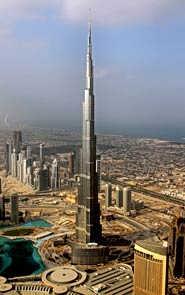 The Burj Dubai |
Dubai has received $10 billion from its neighbour Abu Dhabi to help Dubai World, the ailing state-owned conglomerate, repay a $4.1 billion Islamic debt which matures today.
A statement from the Dubai government said the extra $6 billion would be used to cater to the needs of Dubai World until the end of April 2010.
“We are here today to reassure investors, financial and trade creditors, employees, and our citizens that our government will act at all times in accordance with market principles and internationally accepted business practices,” Sheikh Ahmed bin Saaed al-Maktoum, the chairman of the Dubai Supreme Fiscal Committee said in a statement.
“Dubai is, and will continue to be, a strong and vibrant global financial center. Our best days are yet to come. ” (Sure!)
Nakheel, Dubai World’s property arm said it would meet its Islamic bond obligations – ‘sukuk’ – within the next 14 days.
The United Arab Emirates central bank would also inject liquidity as needed into banks that face exposure to Dubai World a source close to the Dubai government told Reuters

Shares on Dubai’s stock market suffered their biggest one-day fall in more than a year, while Abu Dhabi posted a record one-day drop.
Dubai’s index sank 7.3pc, its biggest one-day fall since October last year. Abu Dhabi’s Securities Exchange endured the largest one-day loss in its history as it ended the session down 8.3pc.
London’s index of Britain’s 100 biggest companies was down around 33 point – or 0.6pc – at 5212 just before 11am after opening up slightly.
While investors judged that the fall-out from Dubai’s debt crisis will not be enough to derail a global recovery, they remained jittery about the possible fallout for banks which have loaned money to the Gulf state.
Read moreDubai and Abu Dhabi stock exchanges post record one-day falls
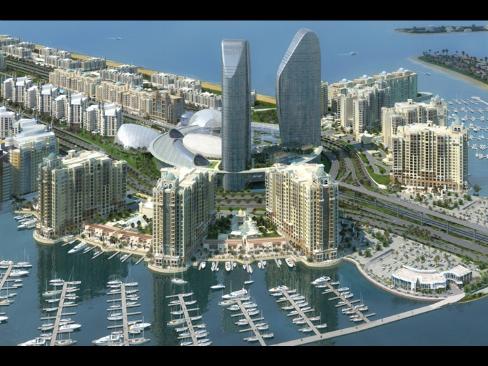
Marina residences at ‘The Palm Jumeirah’ development, also known as Palm Island, built by property developers Nakheel PJSC in Dubai is seen in this undated handout photo released to the media on Nov. 27, 2009. Source: Nakheel via Bloomberg
Nov. 30 (Bloomberg) — Dubai’s government said it hasn’t guaranteed the debt of Dubai World, the state-controlled holding company struggling with $59 billion in liabilities, and that creditors must help it restructure.
“The company received financing based on its project schedule, not a government guarantee,” Abdulrahman Al Saleh, director general of the emirate’s Department of Finance, said in an interview with Dubai TV, when asked whether the government was backing the debt. “Lenders should bear part of the responsibility.”
Dubai’s government said Nov. 25 that Dubai World would seek a standstill agreement with creditors and an extension of loan maturities until at least May 30, 2010. The announcement led to the biggest declines in Asian shares in three months last week and Europe’s worst rout since April. Investors were concerned the proposal risks triggering the biggest sovereign default since Argentina in 2001.
Dubai shares tumbled and Abu Dhabi’s stock index today fell the most in at least eight years on the first trading day since the announcement.
Nakheel PJSC, Dubai World’s property unit whose $3.52 billion Islamic bond is due Dec. 14, asked the Nasdaq Dubai stock market today to suspend its securities “until it is in a position to fully inform the market.”
Read moreDubai Government Does Not Guarantee Dubai World Debt
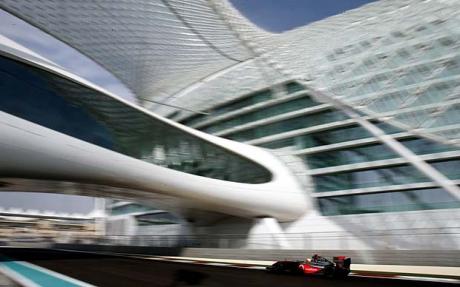
Race is on: power brokers in Abu Dhabi and Dubai are trying to find the right formula to solve the latter’s debt problems. The Yas Marina grand prix circuit in Abu Dhabi is pictured Photo: PA
According to officials, Abu Dhabi, the richest state in the United Arab Emirates, will be cautious about how and whether to assist Dubai World, the state holding company that this week suspended repayments on a $3.5bn (£2.1bn) Islamic bond due in mid-December.
Any sign that Abu Dhabi’s support may not yet be secured could push global markets further into turmoil tomorrow, analysts said, especially if Dubai’s ruler maintains his silence on the crisis beyond this weekend’s Eid religious holiday. Sources said he may be forced to disrupt the 10-day Islamic break to make a statement as early as tomorrow.
“We will look at Dubai’s commitments and approach them on a case-by-case basis. It does not mean that Abu Dhabi will underwrite all of their debts,” a senior Abu Dhabi official said.
“Until things become clearer, it is very difficult to make any further investment decision on the bonds. Many things have to be clarified by Dubai.”
Dubai World’s $59bn of liabilities make up the majority of the emirate’s total $80bn debts.
Dubai is broke and will become a ghost town.
“Altogether, the Dubai government and its companies have more than $80 billion of debt. The emirate, which has a population of only two million, has been forced twice to approach its oil-rich neighbour in Abu Dhabi for the funds to bail it out.”

The Atlantis (!) hotel in Dubai
David Beckham and Brad Pitt are believed to be among the celebrities and sportsmen who bought villas in Palm Jumeirah in Dubai, a luxury development that juts out into the Gulf. But when the property bubble burst this year, residents saw the value of their investments collapse. Yesterday their situation worsened as Nakheel, the developer, and its state-owned parent made a request to suspend debt repayments.
The statement rocked credit mar-kets around the world and prompted analysts to question whether Dubai, the most populous of the United Arab Emirates, will be able to meet its obligations. The concern is that Nakheel will be unable to continue developing the Palm and neighbouring projects, leaving Dubai and its coastal waters an ugly, unfinished construction site.
When the 2,000 villas and townhouses on the Palm went on sale in 2002, they sold out in a month. Passing through en route to the World Cup in Japan and Korea were the England football team, and several players stopped off to sign up for £1 million properties on the artificial island, with Michael Owen, David James, Joe Cole, Andy Cole and Kieron Dyer, it was reported, joining Beckham on the beaches. Pitt and Angelina Jolie are also said to have bought homes.
Joe Cole was one of the few who got out in time. The Chelsea player sold his villa for about $3.5 million (£2.1 million) last summer as Dubai’s property bubble approached bursting point.
Nakheel is now in deep trouble and struggling to cover its debts. Dubai World, a government conglomerate that owns the developer, is $60 billion in the red. Yesterday’s announcement by the Dubai government that it wishes to suspend repayment of Dubai World’s debts for six months, including a $4 billion bond held by Nakheel that was due to be repaid next month, is the clearest indication that the emirate can no longer meet its obligations.
Work has stopped on several major projects around the city and companies have had to accept huge cuts in the value of their contracts. More than 400 projects worth more than $300 billion are said to have been cancelled or shut down as a result of the property collapse.
From the article:
“These plans will change the face of international financial transactions,” one Chinese banker said. “America and Britain must be very worried. You will know how worried by the thunder of denials this news will generate.”
Robert Fisk’s report is accurate and the following denial is just disinformation:
– Oil states say no talks on replacing dollar (Reuters):
ISTANBUL/SYDNEY (Reuters) – Big oil producing nations denied a British newspaper report on Tuesday that Gulf Arab states were in secret talks with Russia, China, Japan and France to replace the U.S. dollar with a basket of currencies in trading oil.
The dollar eased in response to the report, which was written by The Independent’s Middle East correspondent Robert Fisk and cited unidentified sources in Gulf Arab states and Chinese banking sources in Hong Kong.
The plan is to bring down the US. The US constitution is still a major threat to the ‘New World Order’ and the elite.
US citizens need to be disarmed, their freedoms and the dollar need to be destroyed, so that the new global currency and the ‘New World Order’ can be established.
The elite wants to turn the US into a Third World country.
Prepare yourself for the greatest collapse in history.
Got gold (silver, food, water, guns and ammunition)?
– Gold Jumps to Record High as Inflation Outlook Fuels Investor Demand
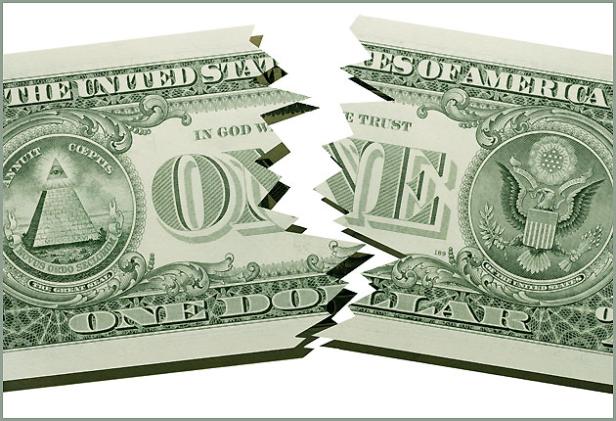
Iran announced late last month that its foreign currency reserves would henceforth be held in euros rather than dollars.
In the most profound financial change in recent Middle East history, Gulf Arabs are planning – along with China, Russia, Japan and France – to end dollar dealings for oil, moving instead to a basket of currencies including the Japanese yen and Chinese yuan, the euro, gold and a new, unified currency planned for nations in the Gulf Co-operation Council, including Saudi Arabia, Abu Dhabi, Kuwait and Qatar.
Secret meetings have already been held by finance ministers and central bank governors in Russia, China, Japan and Brazil to work on the scheme, which will mean that oil will no longer be priced in dollars.
The plans, confirmed to The Independent by both Gulf Arab and Chinese banking sources in Hong Kong, may help to explain the sudden rise in gold prices, but it also augurs an extraordinary transition from dollar markets within nine years.
The Americans, who are aware the meetings have taken place – although they have not discovered the details – are sure to fight this international cabal which will include hitherto loyal allies Japan and the Gulf Arabs. Against the background to these currency meetings, Sun Bigan, China’s former special envoy to the Middle East, has warned there is a risk of deepening divisions between China and the US over influence and oil in the Middle East. “Bilateral quarrels and clashes are unavoidable,” he told the Asia and Africa Review. “We cannot lower vigilance against hostility in the Middle East over energy interests and security.”
This sounds like a dangerous prediction of a future economic war between the US and China over Middle East oil – yet again turning the region’s conflicts into a battle for great power supremacy. China uses more oil incrementally than the US because its growth is less energy efficient. The transitional currency in the move away from dollars, according to Chinese banking sources, may well be gold. An indication of the huge amounts involved can be gained from the wealth of Abu Dhabi, Saudi Arabia, Kuwait and Qatar who together hold an estimated $2.1 trillion in dollar reserves.
Journalist Joseph Kraft, a former member of both the CFR and the Trilateral Commission, said the Council “comes close to being an organ of what C. Wright Mills has called the Power Elite – a group of men, similar in interest and outlook, shaping events from invulnerable positions behind the scenes.” Source: Wikipedia
Related articles:
– Oil Slump Forces Rich Arab Countries to Run Deficits
– Once Booming Dubai Goes Bust
What Lindsey Williams said is coming to pass. The elite is bankrupting the Arabs and driving them back into the desert by keeping the price of oil below $50/barrel:
Lindsey Williams: The Dollar And The US Will Collapse; Saudi Arabia And Dubai Will Fall; US Will Be Third World Country; The Greatest Depression Is Coming
Jan. 15 (Bloomberg) — Abu Dhabi Investment Authority may have lost $125 billion last year, pushing the sovereign wealth fund to second place behind Saudi Arabia, as the global credit crisis eroded the value of its assets, the Council on Foreign Relations (CFR) said.
Abu Dhabi’s fund was “hard hit by the recent fall in global equities,” economists Brad Setser and Rachel Ziemba wrote in a report released on the New York-based organization’s Web site (PDF) “A high allocation to equities, emerging market, and private equity,” contributed to the drop.
The emirate’s fund was managing $328 billion at the end of 2008 compared with $453 billion a year earlier, according to the report, which examined the Gulf region’s four largest sovereign funds. “The size of the Abu Dhabi Investment Authority has been overstated, sometimes by as much as 100 percent.”
The Saudi Arabian Monetary Agency had $501 billion under management at the end of last year, up from $385 billion in 2007, the report said. The Kuwait Investment Authority and the Qatar Investment Authority at the end of last year managed $228 billion and $58 billion, respectively.
Read moreAbu Dhabi Wealth Fund Loss May Be $125 Billion, Saudi Overtakes, Says CFR
Rich governments and corporations are triggering alarm for the poor as they buy up the rights to millions of hectares of agricultural land in developing countries in an effort to secure their own long-term food supplies.
The head of the UN Food and Agriculture Organisation, Jacques Diouf, has warned that the controversial rise in land deals could create a form of “neo-colonialism”, with poor states producing food for the rich at the expense of their own hungry people.
Rising food prices have already set off a second “scramble for Africa”. This week, the South Korean firm Daewoo Logistics announced plans to buy a 99-year lease on a million hectares in Madagascar. Its aim is to grow 5m tonnes of corn a year by 2023, and produce palm oil from a further lease of 120,000 hectares (296,000 acres), relying on a largely South African workforce. Production would be mainly earmarked for South Korea, which wants to lessen dependence on imports.
“These deals can be purely commercial ventures on one level, but sitting behind it is often a food security imperative backed by a government,” said Carl Atkin, a consultant at Bidwells Agribusiness, a Cambridge firm helping to arrange some of the big international land deals.
Read moreRich countries launch great land grab to safeguard food supply
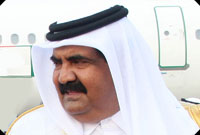
Qatari emir, Sheik Hamad bin Khalifa al-Thani
The emir of Qatar, Sheikh Hamad bin Khalifa al-Thani, has warned that Doha will not allow any country to turn the Persian Gulf into a war zone.
His remarks on the subject come in an environment of long-standing US and Israel threats to launch an attack against Iranian nuclear installations under the pretext that Tehran, a signatory to the nuclear Non-Proliferation Treaty (NPT), is planning to secretly weaponize its civilian use nuclear program.
The international nuclear watchdog, the International Atomic Energy Agency (IAEA), has strongly denied the charge with. IAEA chief Mohammad elBaradei stating he would resign if Iran is attacked on this pretext.
Tehran insists that its program is purely for electricity generation.
Physical demand for gold is surging but the price keeps taking serious knocks. What’s happening.
LONDON – Gold market manipulation conspiracy theorists should be having a field day. The past few weeks have seen solid evidence that physical gold demand from individuals is soaring. We have seen the U.S. Mint having to suspend one ounce Gold Eagle coin sales because of what it terms ‘unprecedented demand’, Indian gold sales have picked up enormously in the past few weeks leading to purchasers having to wait several days for deliveries as the traditional sellers are short of gold, while yesterday we hear that Abu Dhabi, a major trading centre for precious metals, has seen gold sales rise by 300 percent in volume and 250 percent in value in August compared with a year ago.
According to a Reuters report quoting Abu Dhabi Gold and Jewellery Group Chairman Tushar Patni “It was the best month the market has seen in almost 30 years and it compensated for any drops we have seen earlier this year. We had never expected that if gold fell below $800 an ounce we would see a 300 percent increase in volume and 250 percent in value, especially as many buyers are abroad on holiday.”
Read moreGold demand soars. Price falls. What’s going wrong?
The Wall Street investment bank Lehman Brothers is this weekend locked in talks with a group of foreign government-backed investment funds in an effort to secure billions of dollars in new equity capital.
The Sunday Telegraph has learned that Lehman has intensified talks in recent days with Korea Development Bank, the South Korean government-backed lender, about a capital injection of as much as $6bn (£3.3bn). KDB has drafted in bankers from the heavyweight advisory boutique Perella Weinberg to provide counsel on the talks, which could be concluded this week.
Read moreLehman Brothers in urgent talks on capital injection
 AP photo / Brennan Linsley
AP photo / Brennan Linsley
Members of the Iranian resistance group Mujahadeen-e Khalk, or MEK, guard a road leading to the group’s main training camp, watched over by a U.S. Army Abrams tank in background, near Baqubah in north-central Iraq.
By Scott Ritter
The war between the United States and Iran is on. American taxpayer dollars are being used, with the permission of Congress, to fund activities that result in Iranians being killed and wounded, and Iranian property destroyed. This wanton violation of a nation’s sovereignty would not be tolerated if the tables were turned and Americans were being subjected to Iranian-funded covert actions that took the lives of Americans, on American soil, and destroyed American property and livelihood. Many Americans remain unaware of what is transpiring abroad in their name. Many of those who are cognizant of these activities are supportive of them, an outgrowth of misguided sentiment which holds Iran accountable for a list of grievances used by the U.S. government to justify the ongoing global war on terror. Iran, we are told, is not just a nation pursuing nuclear weapons, but is the largest state sponsor of terror in the world today.

Vladimir Putin (left), then the president of Russia, met with Muammar Qaddafi, the Libyan leader, in April to discuss arms, energy and debt. AFP
Employing strategies redolent of a new Great Game, Russia has stepped up its diplomatic and trade activities in the Middle East and North Africa in a bid to enhance its geopolitical clout and gain access to, and at least partial control over, the region’s oil and gas reserves.
Among the former global superpower’s tactics: linking arms deals and debt-forgiveness to energy deals.
The strategy has been most apparent in former client states of the Soviet Union including Libya, Iraq and Syria, although by no means limited to such countries. Moreover, Moscow has not shied away from courting the authoritarian regimes of countries such as Iran, Syria and Libya that are or have been shunned by the US and other western governments.